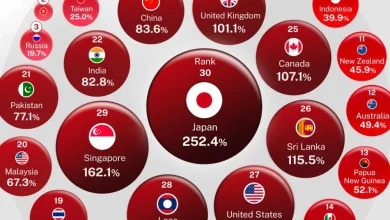What Industries Are Thriving or Struggling in 2023?

Industries had a mixed bag in 2023. As people became more dependent on technology, especially artificial intelligence (AI) and cybersecurity, technology flourished. Healthcare also prospered, particularly biotech and telemedicine. Global trends helped e-commerce, logistics, and renewable energy.
However, traditional retail found it difficult to compete with online retailers. One The travel business suffered difficulties as it recovered from the pandemic, while the oil and gas sectors saw volatility. The growth of remote employment also put strain on commercial real estate.
1. Fastest Growing Industries
- Electric Vehicles (EVs) – The EV industry is booming with increasing consumer demand for environmentally friendly transportation, government incentives, and expanding infrastructure. Analysts predict that the global EV market will continue to grow at a rapid pace
- Healthcare and Biotechnology – Innovations in biotechnology, along with an aging global population, make the healthcare industry one of the fastest-growing sectors, especially in the areas of drug development, personalized medicine, and healthcare technologies
- E-commerce and Online Retail – The e-commerce sector continues to thrive, driven by shifting consumer behavior towards online shopping, especially for essential goods, tech products, and fashion
- Cybersecurity: The cybersecurity sector is growing at an exponential rate as data breaches and cyberthreats become more common. More companies are spending money on cutting-edge security procedures to safeguard private data.
- Cloud Computing: Businesses’ need for scalability and remote work capabilities is driving an increase in demand for cloud services, such as data storage, software-as-a-service (SaaS), and cloud-based solutions.
- Health and Wellness: As consumers place greater value on their physical and emotional well-being, the health and wellness sector is expanding, offering everything from exercise to mental health services.
- Financial Technology, or FinTech, With advancements in digital wallets, cryptocurrencies, and blockchain technology, the FinTech sector is expanding quickly as digital banking and payment systems gain popularity.

2. What industries will suffer in 2023?
Numerous industries are confronted with formidable obstacles in 2023 that may impede their expansion. Pressure is mounting on fossil fuels as the globe moves toward renewable energy. Companies in the coal, oil, and gas industries are struggling with diminishing earnings as a result of this shift in demand. Due to the inability of many firms to keep up with the growth of e-commerce, traditional retail is also having difficulties. Brick and mortar establishments are closing more frequently as more customers choose to purchase online.
Inflation, high travel expenses, and persistent economic uncertainty have all reduced consumer spending in the tourism and hospitality industry, particularly on pricier luxuries. As the automotive industry shifts to electric cars (EVs), automobile manufacturing is also experiencing change. Although traditional gas-powered automakers are making significant investments to meet the demand for electric vehicles, this change may put a burden on their finances. Finally, labor shortages, erratic weather patterns, and interruptions in global supply chains are causing problems for some agriculture subsectors.
3.Industries That Can Thrive During Recessions
Important Products and Services:
Food and Drink: Regardless of financial circumstances, people still need to eat.
Healthcare: There is a steady need for healthcare services, particularly for urgent requirements and preventive care.
Utilities: People are constantly in need of basic services like gas, electricity, and water.
Discount Stores:
Dollar Stores and Thrift Shops: During recessions, consumers frequently look for deals, which makes cheap stores a popular option.
Technology
Software and IT Services: Companies frequently spend money on technology to increase productivity and cut expenses.
Cybersecurity: As cyberthreats becoming more complex, there is a growing need for cybersecurity solutions.
Services related to finance:
Banking and Insurance: Even in hard circumstances, people still require financial services like banking, insurance, and investment guidance.
Home Renovation:
DIY Stores and Contractors: People may choose to renovate or repair their homes rather than move, leading to increased demand for home improvement services.
Remember, while these industries tend to be more resilient during recessions, it’s important to adapt to changing market conditions and consumer behavior.
Conclusion:
Technology, healthcare, renewable energy, and electric vehicles (EVs) are all experiencing strong growth in 2023 thanks to continuous developments in automation, sustainability, and innovation. The high need for eco-friendly transportation, renewable energy, and AI solutions is propelling growth in these industries. However, established industries like tourism, real estate, retail, and fossil fuels are having trouble because of changing consumer habits, unstable economies, and environmental concerns. Companies will need to adjust to these changing patterns in order to overcome obstacles and take advantage of opportunities in the dynamic global economy.
FAQs:
1.What industries are struggling in 2023?
In 2023, a number of industries are having problems. While the shift to renewable energy sources is hurting fossil fuels, traditional retail is struggling because of e-commerce’s dominance. Global unpredictability and growing travel expenses have left the tourism and hospitality industry vulnerable. High interest rates and skyrocketing home values are slowing down the real estate market, while the transition to electric vehicles and customer reluctance are hurting the auto industry.
2. How is the renewable energy sector performing in 2023?
In 2023, a number of industries are experiencing challenges. Transitioning to renewable energy sources is hurting fossil fuels, and e-commerce’s dominance is hurting traditional retail. Rising travel expenses and worldwide unpredictability have left the tourism and hospitality industry vulnerable. Rising housing prices and rising interest rates are slowing down the real estate market, while the switch to electric vehicles and consumer reluctance are hurting the auto industry.”
3. Why is the technology and AI industry thriving?
A number of interrelated elements are contributing to the success of the technology and AI sector. First, businesses are increasingly using automation and artificial intelligence (AI) to boost customer satisfaction, cut expenses, and raise operational efficiency. AI is being used widely in industries including marketing, healthcare, and finance because of its capacity to handle and analyze enormous volumes of data, which enables companies to obtain insights and make smarter decisions more quickly.
Furthermore, cloud computing has emerged as a key AI enabler since it enables companies to remotely access and store vast volumes of data, increasing the scalability and affordability of AI tools and applications.



